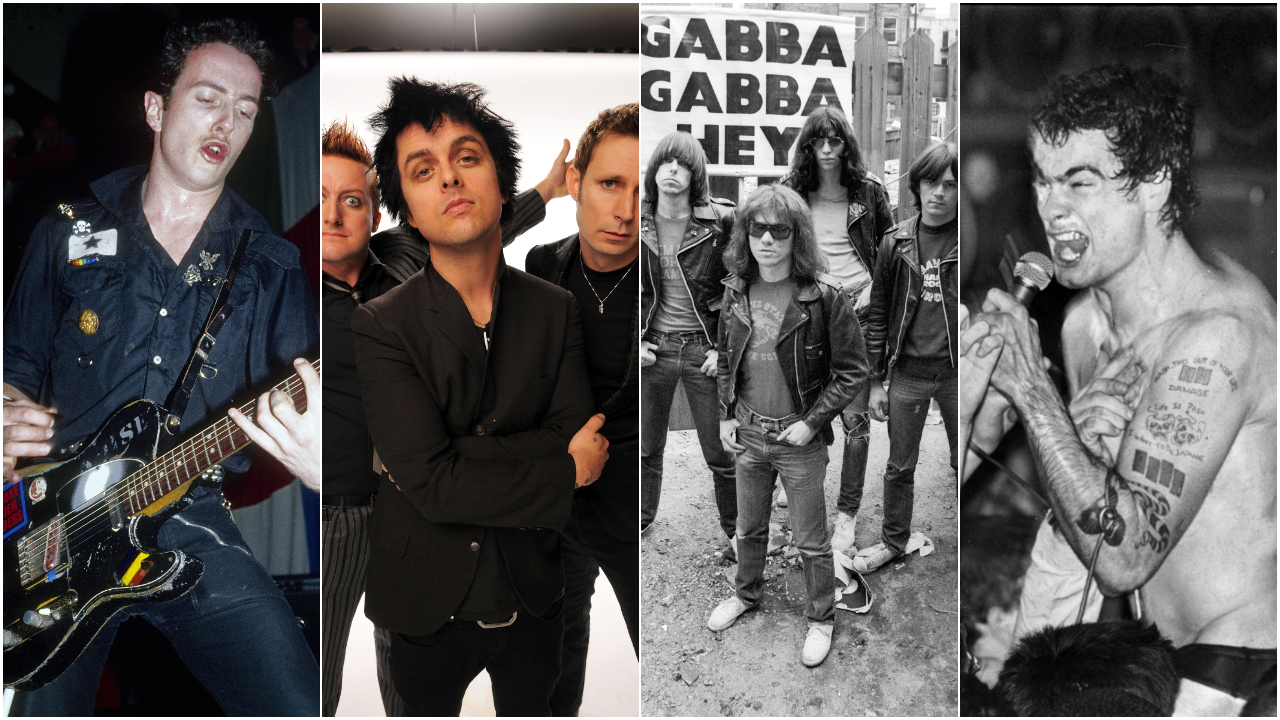10 terrible punk albums with one classic song
These punk albums are stinkers that only a mother could truly love, but each features one redeeming, gleaming diamond in the dirt

Genius is 1% inspiration and 99% perspiration the great American inventor Thomas Edison once said, and in the music industry, with its relentless, energy-sapping schedules and constant demand for new 'product', tapping into that 1% isn't always easy, even for the greatest bands. Somewhat cheekily, and wildly inaccurately, Canadian pop-punks Sum 41 launched their career with an album titled All Killer, No Filler, but here are 10 examples of punk albums where the ratio is one killer, the rest filler.

The Clash - This Is England (Cut The Crap, 1985)
The Phantom Menace of Clash albums, chronological differences aside, in that hardcore fans, and the surviving band members would like to pretend it doesn't, and didn't ever, exist: in a shameless piece of historical airbrushing, official band documentary, Westway To The World, doesn’t even mention it. If one were to cut the crap from The Clash's sixth and final album, it could be released as a seven inch single, with a photo of the Mick Jones-free line-up etched into its B-side, because only the brilliant drum machine-and-synths-assisted state of Thatcher's nation smackdown This Is England would survive the cull. The rest of the album? Pure shit.
Green Day - Know Your Enemy (21st Century Breakdown, 2009)
Far from an artistic disaster, Green Day's sixth studio album, 2000's Warning, limped slowly towards gold certification in the US, and critical consensus around the start of the new millennium held that Billie Joe Armstrong's band would soon slide quietly out of view. That notion, however, was blown out of the water by the East Bay trio's remarkable, multi-faceted American Idiot album, a rock opera for a new generation. With 2009's 21st Century Breakdown, Green Day aimed to make another Big Statement, but choked on their own ambition, delivering an over-long three act collection sagging with overblown, relentlessly mediocre material. To be fair, the plodding 21 Guns has racked up over 500 million plays on Spotify, so clearly it's struck a chord with many, but really it's the album's combative first single, Know Your Enemy, which is the sole true banger here. For better or worse, Green Day haven't shot for the moon since.
Ramones - The KKK Took My Baby Away (Pleasant Dreams, 1981)
They may be posthumously viewed as punk rock's kings of the outcasts, misfits, freaks and geeks, but back in the day, Ramones wanted to be massive. "They originally thought that their songs were so good that they’d sell five million copies of their first album, and then be able to retire rich, and never have to bother with one another again," original manager Danny Fields told this writer in 2016. "But it didn’t happen that way.”
After the nakedly-commercial, Phil Spector-produced End Of The Century gave the band their highest ever US chart position (peaking at number 44), Sire Records pushed Da Bruddahs to broaden their appeal and truly shoot for a mainstream breakthrough. But with spiralling issues with drugs and alcohol exacerbating internecine strife, the group lacked focus, and the mild-mannered Pleasant Dreams lacked both cohesion and snap, except on its obvious highlight. The often-repeated suggestion that The KKK Took My Baby Away is Joey Ramones' deliciously barbed response to his ex-girlfriend Linda switching her romantic interest to his politically conservative bandmate Johnny may be apocryphal, but it's a great story and an even better song, and no-one wants pesky reality to get in the way here.
Gen X - Dancing With Myself (Kiss Me Deadly, 1981)
An ill-advised attempt to rebrand and reintroduce Class of '77 punks Generation X as a new wave/new romantic band for a new decade, Kiss Me Deadly was hampered by singer Billy Idol's increasing drug use, and Gen X's new US management's none-too-subtle interest in steering their platinum-blonde frontman towards a solo career. When Kiss Me Deadly failed to chart anywhere, Idol moved to New York, hooked up with the gifted Steve Stevens, and duly remixed and re-released its only single, Dancing With Myself, as his first solo single in 1981, then again in 1983, ahead of the release of his second solo album, Rebel Yell. By then, Gen X were a mere footnote in history, and Kiss Me Deadly was rightly consigned to bargain bins forever.
Blink-182 - Dammit (Dude Ranch, 1997)
Fair play to the MCA Records talent scout who heard Blink-182's teen-punk yelps on their debut album Cheshire Cat and thought, 'Here's a band that will make us millions of dollars'. Their faith must have been sorely tested when Mark Hoppus, Tom DeLonge and Scott Raynor handed in the masters of the wilfully juvenile, grating and utterly inessential Dude Ranch... until they heard Dammit. Hoppus' tale of a fictional break-up and the dawning realisation that good things won't last forever could hardly have been more relatable to Blink's high school-age fan-base, and backed with a witty and self-deprecating video, the song would propel Blink into the consciousness of the Warped Tour generation.
The Members - The Sound Of The Suburbs (At The Chelsea Nightclub, 1979)
The Sound Of The Suburbs is a definitive punk rock anthem, a rallying cry for "kids from small towns who weren’t part of the metropolitan elite and wanted to be part of it", as songwriter JC Caroll told The Guardian in 2021. At The Chelsea Nightclub, however, is no Never Mind The Bollocks. It might be technically wrong to label The Members 'one hit wonders', but if you can name their only other UK Top 40 hit then chances are you're a former Members member.
The latest news, features and interviews direct to your inbox, from the global home of alternative music.
The Offspring - I'll Be Waiting (The Offspring, 1989)
It's fair to say that The Offspring existed very much in embryonic form at the point at which they recorded their debut single in 1986: so embryonic, that guitarist Noodles wasn't yet called Noodles, and is credited on the sleeve of I'll Be Waiting as 'Child C-2017', whatever that meant. Truthfully, we're being more than a little generous to describe I'll Be Waiting as a "classic" song, but re-recorded for the Californian band's debut album, it at least hints at the potential in Dexter Holland's songwriting, unlike precious little else on the enthusiastic but generic collection.
Black Flag - My War (My War, 1984)
There's a fine essay elsewhere on this site explaining why Black Flag's second album My War was a key release in the development of the American underground rock scene. Its sludgy, dense riffs and nihilistic lyrics, a deliberate challenge to hardcore punk orthodoxy, were received especially well in Seattle, home to a contrarian punk community whose key players still secretly listened to their Zeppelin, Sabbath and Aerosmith albums in their teenage bedrooms when their friends weren't around to judge them.
With that said, and with all due respect to its jolting, shock-to-the-system impact in 1984, My War is, for the most part, and certainly on side B, a tedious, gruelling slog, recorded by a band who at the time had just three members, with Chuck Dukowski and Dez Cadena both having bailed, leaving Greg Ginn to take on dual guitar and bass duties himself. Dukowski's ferocious title track, with its fiercely confrontational, finger-pointing lyrics, is one of Black Flag's definitive, deathless ragers, but after that, if you genuinely want to hear no-fucks-given, grimy, sludgy riff-rock, spend your time instead with the album Ginn's SST label released just ahead of My War, Saint Vitus' self-titled debut.
Angelic Upstarts - Last Night Another Soldier (2,000,000 Voices, 1981)
South Shields punks Angelic Upstarts were a band with their hearts very much in the right place, an anti-fascist, proudly working class, left-learning collective with thought-provoking lyrics which were more than mere sloganeering. But across the course of a full album, their musical craft and acumen often didn't match up to frontman Mensi's sharp observations. For all its good intentions, 2,000,000 Voices is a pedestrian listen, but Last Night Another Soldier, a commentary on economic conscription, political cowardice, 'The Troubles' and tit-for-tat violence deserves a better platform.
The Stranglers - Golden Brown (La Folie, 1981)
It's perhaps unfair to castigate The Stranglers for trying something different on La Folie, the second of the two albums they released 1981, given that a) they'd been moving away from punk rock since 1977 and b) were never actually a punk rock band in the first place. But following up their bold prog-punk concept album The Gospel According To The Meninblack, which admittedly no-one bought, with the slick and polished La Folie, seemed like a climb-down and a compromise for this most uncompromising of bands. The quartet's sixth album does, however, include the undeniably brilliant Golden Brown, Hugh Cornwell's warm-hearted celebration of the two things in life which made him happy at the time, his girlfriend and heroin, which reached number 2 in the UK charts and opened the band up to a mainstream audience.

A music writer since 1993, formerly Editor of Kerrang! and Planet Rock magazine (RIP), Paul Brannigan is a Contributing Editor to Louder. Having previously written books on Lemmy, Dave Grohl (the Sunday Times best-seller This Is A Call) and Metallica (Birth School Metallica Death, co-authored with Ian Winwood), his Eddie Van Halen biography (Eruption in the UK, Unchained in the US) emerged in 2021. He has written for Rolling Stone, Mojo and Q, hung out with Fugazi at Dischord House, flown on Ozzy Osbourne's private jet, played Angus Young's Gibson SG, and interviewed everyone from Aerosmith and Beastie Boys to Young Gods and ZZ Top. Born in the North of Ireland, Brannigan lives in North London and supports The Arsenal.
